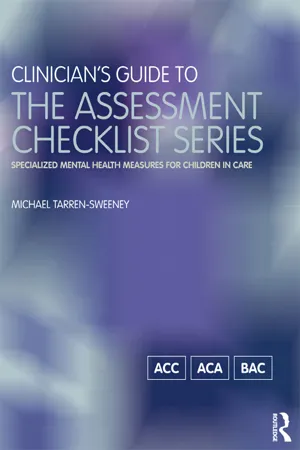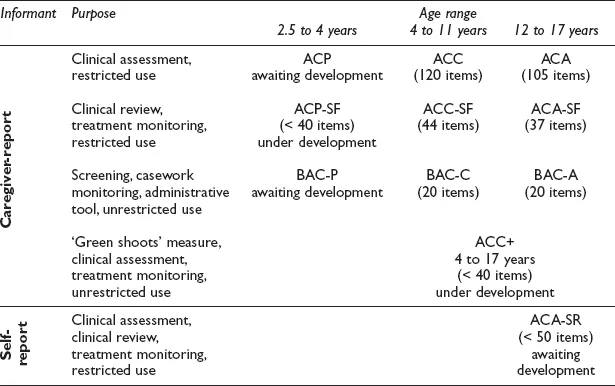![]()
Part I
Overview and user information
![]()
Chapter 1
Introducing the Assessment Checklist measures
ACC, ACA and BAC
The Assessment Checklist measures are a series of empirically-derived caregiver-report rating instruments that measure mental health difficulties observed among children and young people in alternate care (‘out-of-home care’, ‘looked after children), those who are subsequently adopted from care, and maltreated children at large. While the Assessment Checklist measures were initially developed for use in epidemiological and clinical research, they are also standardized for use as clinical assessment and screening instruments.
The Assessment Checklist measures were designed to measure mental health symptoms that are characteristically observed among these groups, and which are not adequately measured by standard parent-report checklists, such as the Child Behavior Checklist (CBCL) and the Strengths and Difficulties Questionnaire (SDQ). Comprehensive coverage of the psychiatric symptomatology of children and young people in care is thus obtained when an Assessment Checklist measure is used in combination with an instrument that measures more common difficulties observed among children at large, such as the CBCL.
The Assessment Checklist measures are:
• The Assessment Checklist for Children (ACC, 120 items), for use in comprehensive mental health assessment of children aged 4 to 11 years, with user restrictions.
• The Assessment Checklist for Children – Short Form (ACC-SF, 44 items), for use in mental health reviews and treatment monitoring of children aged 4 to 11 years, with user restrictions.
• The Assessment Checklist for Adolescents (ACA, 105 items), for use in comprehensive mental health assessment of young people aged 12 to 17 years, with user restrictions.
• The Assessment Checklist for Adolescents – Short Form (ACA-SF, 37 items), for use in mental health reviews and treatment monitoring of young people aged 12 to 17 years, with user restrictions.
• The Brief Assessment Checklist for Children (BAC-C, 20 items), for mental health screening and casework monitoring of children aged 4 to 11 years, without user restrictions.
• The Brief Assessment Checklist for Adolescents (BAC–A, 20 items), for mental health screening and casework monitoring of young people aged 12 to 17 years, without user restrictions.
Assessment Checklist measures that are under development or consideration:
• Assessment Checklist for Children Plus (ACC+). A relatively brief ‘green shoots’ measure of behaviours suggesting adaptive, pro-social functioning and well-being, for use in comprehensive mental health assessment and treatment monitoring of children and young people aged 4 to 17 years, without user restrictions.
• Assessment Checklist for Preschoolers – Short Form (ACP-SF). A short form caregiver-report checklist designed to measure the mental health difficulties of children in alternate care and adoption, in the second half of their first five years of life (that is, from age 30 to 60 months). Long form (ACP) and screening (BAC-P) versions will be developed further down the track after the ACP-SF has been piloted in population studies.
• Assessment Checklist for Adolescents – Self-report (ACA-SR). The viability of developing a relatively brief (fewer than 50 items) self-report version of the Assessment Checklist for Adolescents is presently being considered. This measure would need to be restricted to ACA items that young people are able to accurately reflect on, and which are relatively non-confronting.
Table 1.1 The Assessment Checklist series: measures that are completed, under development and awaiting development
Overview
The Assessment Checklist for Children – ACC
The ACC is a 120-item carer-report psychiatric rating instrument, measuring behaviours, emotional states, traits and manners of relating to others, as manifested by children in care and those adopted from care. The ACC’s content was developed systematically, with a view to measuring all clinically significant problems experienced by children in alternate care that are not adequately measured by standard parent-report checklists. Ten clinical and two low self-esteem scales were empirically derived via factor analysis. Initial data indicate that the instrument has good content, construct and criterion-related validity. Comprehensive survey estimates of the mental health of children in care can be obtained using the ACC in parallel with the CBCL. The instrument also provides a means for studying the characteristics and determinants of complex psychopathology manifested by child welfare populations. The ACC has ten clinical scales and two low self-esteem scales that were empirically-derived through factor analysis.
The ACC clinical scales are:
I | Sexual behaviour |
II | Pseudomature interpersonal behaviour |
III | Non-reciprocal interpersonal behaviour |
IV | Indiscriminate interpersonal behaviour |
V | Insecure interpersonal behaviour |
VI | Anxious–distrustful |
VII | Abnormal pain response |
VIII | Food maintenance behaviour |
IX | Self-injury |
X | Suicide discourse |
The ACC low self-esteem scales are:
I | Negative self-image |
II | Low confidence |
The ACC Clinical Scale I measures age-inappropriate sexual behaviour. Scales II to V measure various forms of maladaptive interpersonal relatedness that are suggestive of attachment disorder behaviours and/or attachment-related social difficulties. Scale II describes a pattern of precious pseudo-maturity and role reversal. Scale III describes emotionally withdrawn, avoidant and non-reciprocal social behaviours, with high scores being suggestive of a severely avoidant-insecure attachment style and/or inhibited form of reactive attachment disorder. Scale IV describes a pattern of indiscriminate overfriendliness, affection-seeking and attention-seeking behaviours, resembling the disinhibited form of reactive attachment disorder. Scale V measures a range of social behaviours and emotional difficulties suggestive of felt insecurity that is likely to reflect both trait insecurity (insecure attachment, temperament) and state insecurity (e.g. as a response to severe stressors, such as impermanent care). Scale VI measures a pattern of trauma-related anxiety and distrust. Scale VII measures a pattern of abnormal responses to physical hurt suggestive of pain insensitivity or failure to communicate felt pain. Scale VIII measures a pattern of excessive eating and food acquisition (termed food maintenance syndrome), that appears to be primarily triggered by acute stress, and which resembles the behavioural correlates of Hyperphagic Short Stature. Scale IX primarily measures various types of self-injurious behaviour, but also measures three pica-type behaviours. Scale X measures suicidal talk, attempted suicide and some other behaviours indicating risk for self-harm. The ACC Low Self-Esteem Scale I measures self-evaluations that suggest a profoundly negative self-image, while Scale II measures self-evaluations suggesting discouragement and low confidence in one’s social, educational or other abilities.
Non-putative labels
The naming of scales is problematic, as it can inadvertently infer causality, or underlying theoretical constructs. Non-putative terms were selected for the ACC and ACA scales because they were largely derived empirically, and because maltreatment and attachment syndromes are as yet inadequately conceptualised. For example, ‘abnormal pain response’ was used in preference to ‘pain dissociation’ or ‘pain agnosia’, since the latter terms imply specific mechanisms.
Translations
At the time of this book’s publication, the ACC response forms had been translated into German, Norwegian, Romanian and Spanish, while a number of European researchers were working on Portuguese, Russian, Serbian and Swedish language translations.
The Assessment Checklist for Children – Short Form – ACC–SF
The Assessment Checklist for Children – Short Form (ACC–SF) is a 44-item short form of the ACC that was developed primarily for use as a research instrument and as a relatively brief treatment monitoring measure. It excludes the low self-esteem scales, the suicide discourse scale and the pica index from the self-injury scale. The full version of the ACC is recommended for comprehensive mental health assessment, and the Brief Assessment Checklist for initial mental health screening.
The Assessment Checklist for Adolescents – ACA
The ACA is a 105-item, caregiver-report, psychiatric rating scale that measures behaviours, emotional states, traits and manners of relating to others, as manifested among 12 to 17 year-old young people in care, as well as young people who are adopted from care or who have a history of maltreatment. The ACA was designed to measure a broad range of mental health difficulties observed among young people in various types of care, that are not adequately measured by standard rating instruments, such as the CBCL, SDQ and Conners scales.
The ACA has seven clinical scales and two low self-esteem scales that were empirically-derived through factor analysis.
The ACA clinical scales are:
I | Non-reciprocal interpersonal behaviour |
II | Social instability/behavioural dysregulation |
III | Emotional dysregulation/distorted social cognition |
IV | Dissociation/trauma symptoms |
V | Food maintenance behaviour |
VI | Sexual behaviour |
VII | Suicide discourse |
The ACA low self-esteem scales are:
I | Negative self-image |
II | Low confidence |
The ACA Clinical Scale I describes emotionally withdrawn, avoidant and non-reciprocal social behaviours, with high scores being suggestive of a severely avoidant-insecure attachment style and/or inhibited form of reactive attachment disorder. Scale II describes a complex combination of unstable, attachment-related social relatedness difficulties and behavioural dysregulation. This scale incorporates the majority of items contained in the ACC Pseudomature and Indiscriminate scales. Scale III describes a pattern of highly dysregulated emotion and affective instability, coupled with distorted social cognition (negative attributions, paranoid beliefs). Scale IV measures a pattern of trauma-related dissociation and anxiety symptoms. Scale V measures a pattern of excessive eating and food acquisition (termed food maintenance syndrome), that appears to be primarily triggered by acute stress, and which resembles the behavioural correlates of Hyperphagic Short Stature. Scale VI measures age-inappropriate sexual behaviour. Scale VII measures suicidal talk, attempted suicide and some other behaviours indicating risk for self-harm. The ACA Low Self-Esteem Scale I measures self-evaluations that suggest a profoundly negative self-image, while Scale II measures self-evaluations suggesting discouragement and low confidence in one’s social, educational or other abilities.
The Assessment Checklist for Adolescents – Short Form – ACA–SF
The Assessment Checklist for Adolescents – Short Form (ACA–SF) is a 37-item short form of the ACA that was developed primarily for use as a research instrument and as a relatively brief treatment monitoring measure. It excludes the low self-esteem scales and the suicide discourse scale. The full version of the ACA is recommended for comprehensive mental health assessment, and the Brief Assessment Checklist for initial mental health screening.
Brief Assessment Checklists (BAC–C and BAC–A)
The Brief Assessment Checklist for Children (BAC–C), and the Brief Assessment Checklist for Adolescents (BAC–A) are 20-item caregiver-report psychiatric rating scales designed to: (a) screen for and monitor clinically-meaningful mental health difficulties experienced by children and adolescents in various types of care; and (b) be safely administered a...

